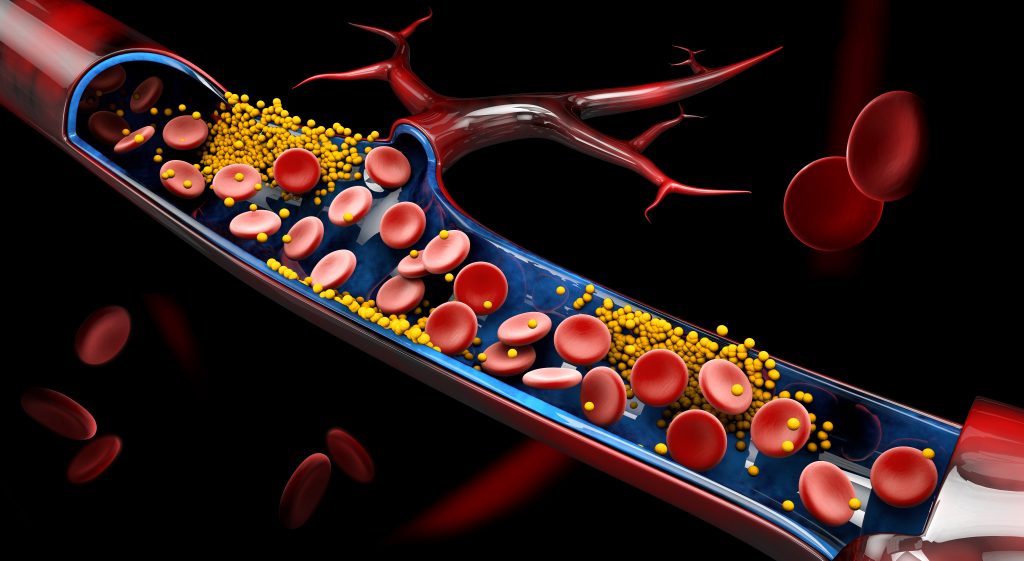In part 1 of this article, I discussed the importance of proper evaluation and diagnosis of cholesterol issues and explored the main causes of dyslipidemia. In part 2, we will delve into effective strategies for correcting abnormal levels of blood lipids.
Nutrition and Dyslipidemia
I also mentioned that for me dyslipidemia is a symptom, not the actual condition, and that the main common offenders for the 3 blood lipids mentioned are:
- Poor nutrition, with all the consequences
- Inflammation
- Oxidative Stress
So, what is the actual condition?
Giving the body the wrong type of food! And honestly, it can also explain probably about 75% of the conditions known to man. If you add excess stress, lack of sleep, and no exercise, you’ll have the recipe for the perfect storm.
Food is powerful information and the human body is the most magnificent and outstanding “machine” ever created. It doesn’t matter how perfect the machine is, if you give the wrong information and the wrong fuel, that machine won’t be able to do what it is supposed to do.
Is nutrition the same for everyone? Not. We are individuals, and as such, different people need different approaches. As Lucretius said more than 2,000 years ago, one man’s food is another man’s poison, which brings me to my next point.
What is the right food for me?
As I wrote before, the one size fits all approach doesn’t work, but there are specific rules that I believe everybody should follow, and they are to stay away from:
- Omega 6 fatty acids, and more specifically, seed oils.
- Sugar, fructose, and artificial sweeteners.
- All types of processed foods.
In my practice, I’ve found that insulin sensitivity is not only the most important determinant for prescribing the right eating plan but also to get optimal blood lipid levels. If insulin sensitivity is poor and carbohydrates are consumed, the consequences are blood sugar dysregulation and excess insulin, which increases inflammation, oxidative stress, and glycation.
This means that people with low insulin sensitivity should follow a low-carb diet, and in some extreme cases, according to Dr. Mark Houston, some of them have to stay below 30 grams of carbs per day to experience profound changes.
On the other hand, a person with good insulin sensitivity won’t have the aforementioned problems when consuming carbohydrates but can cause dyslipidemia by consuming high quantities of fats.
Another important factor here is the amount of food consumed. Remember that excess amounts of any macronutrient can elevate triglyceride levels. So, let’s say that a person is not insulin sensitive and follows a low-carb diet, but consumes excess amounts of proteins and fats. Most probably that person will show some form of alteration of blood lipids. If another person is insulin sensitive and is careful with fat ingestion, but consumes excess amounts of carbs, again, this person will show some form of dyslipidemia.
One of the Metabolic Balance Practitioners can quickly assess your insulin sensitivity, hormonal profiles, and body fat percentage, and point you in the right direction, including the amount of food consumed, by re-assessing every 1-2 weeks.
Another option is to find a doctor that is willing to prescribe a cholesterol panel every week along with the types of amounts of foods to consume weekly, to experiment and find the right types and amounts of foods. This process can take months, will cost a lot, and the chances to find that doctor are extremely low.
In essence, the right types of foods along with their correct amounts will normalize blood lipids levels in a very short time, about 4 weeks. But there are cases when some other interventions are needed, and no, I’m not talking about medications of any kind.
Supplements and Foods for Improving Blood Lipids
Let’s explore specific supplements and foods that can help improve each type of blood lipid:
Low-Density Lipoprotein (LDL)
LDL, or “bad” cholesterol, is affected by immune vascular function, inflammation, oxidation, and blood sugar dysregulation. The following supplements address these issues effectively:
- Fish Oil: Decreases inflammation, improves blood sugar levels, and increases LDL particle size, reducing their number.
- Niacin: Increases LDL particle size, reducing their number.
- Green Tea Extract (EGCG): Reduces oxidation and improves blood sugar levels.
- Olive Oil: Reduces oxidation and improves blood sugar levels.
- Red Yeast Rice: Reduces inflammation and oxidative stress.
- Plant Sterols: Compete with cholesterol for absorption in the intestines.
- Soluble fibers: Absorb cholesterol for excretion.
It is important to note that when inflammation, oxidation, and blood sugar dysregulation are corrected, immune vascular function tends to normalize.
High-Density Lipoprotein (HDL)
HDL, or “good” cholesterol, is influenced by inflammation, oxidation, and blood sugar dysregulation. The following supplements can help improve HDL levels and function:
- Fish Oil: Decreases inflammation and improves blood sugar levels.
- Green Tea Extract (EGCG): Reduces oxidation and inflammation, enhancing HDL function.
- Niacin: Improves HDL function.
- Flavonoids (anthocyanins, quercetin, and lycopene): Decrease inflammation and oxidation.
- Berberine: Increases HDL levels.
- Pomegranate juice and seeds: Enhance LDL transport out of cells.
- Olive Oil: Decreases oxidation and improves HDL function.
Triglycerides
Triglyceride levels respond to some of the supplements and foods mentioned for LDL. Consider incorporating the following:
- Fish Oil: Reduces triglycerides, and inflammation, and improves blood sugar levels.
- Niacin: Reduces triglyceride levels.
- Berberine: Reduces triglyceride levels.
- Olive Oil: Reduces triglyceride levels.
Supplements and Foods for Improving Blood Lipids
Let’s explore specific supplements and foods that can help improve each type of blood lipid:
Low-Density Lipoprotein (LDL)
LDL, or “bad” cholesterol, is affected by immune vascular function, inflammation, oxidation, and blood sugar dysregulation. The following supplements address these issues effectively:
- Fish Oil: Decreases inflammation, improves blood sugar levels, and increases LDL particle size, reducing their number.
- Niacin: Increases LDL particle size, reducing their number.
- Green Tea Extract (EGCG): Reduces oxidation and improves blood sugar levels.
- Olive Oil: Reduces oxidation and improves blood sugar levels.
- Red Yeast Rice: Reduces inflammation and oxidative stress.
- Plant Sterols: Compete with cholesterol for absorption in the intestines.
- Soluble fibers: Absorb cholesterol for excretion.
It is important to note that when inflammation, oxidation, and blood sugar dysregulation are corrected, immune vascular function tends to normalize.
High-Density Lipoprotein (HDL)
HDL, or “good” cholesterol, is influenced by inflammation, oxidation, and blood sugar dysregulation. The following supplements can help improve HDL levels and function:
- Fish Oil: Decreases inflammation and improves blood sugar levels.
- Green Tea Extract (EGCG): Reduces oxidation and inflammation, enhancing HDL function.
- Niacin: Improves HDL function.
- Flavonoids (anthocyanins, quercetin, and lycopene): Decrease inflammation and oxidation.
- Berberine: Increases HDL levels.
- Pomegranate juice and seeds: Enhance LDL transport out of cells.
- Olive Oil: Decreases oxidation and improves HDL function.
Triglycerides
Triglyceride levels respond to some of the supplements and foods mentioned for LDL. Consider incorporating the following:
- Fish Oil: Reduces triglycerides, and inflammation, and improves blood sugar levels.
- Niacin: Reduces triglyceride levels.
- Berberine: Reduces triglyceride levels.
- Olive Oil: Reduces triglyceride levels.
Addressing Lifestyle Factors
While nutrition, supplementation, and foods play a crucial role in maintaining healthy blood lipid levels, addressing lifestyle factors is equally important.
You can eat right and take the supplements, but if your stress levels are constantly elevated, you are chronically sleep-deprived and you do not exercise, dyslipidemia will still show on your blood panels.
Exercise:
In my opinion, the best form of exercise is resistance training, and it has been shown to have profound effects on blood lipids and overall health. Lifting weights 4 times per week has shown the biggest benefits.
Also, according to research, High-Intensity Interval Training produces important benefits for cardiovascular health.
And yes, you can do both, as long as you have a full day off.
Sleep:
Proper sleep is mandatory not only for healthy blood lipid levels but for every single function inside your body. From hormonal to brain function. Click here for a complete guide on how to get your sleep back.
Stress Management:
Controlling stress levels is also of paramount importance for healthy blood lipids and overall health. Embarking in any type of activity for managing stress will be beneficial. There are plenty of options like meditation, yoga, breathing, etc.
As you can see, having healthy blood lipid levels requires addressing multiple fields like nutrition, supplementation, and lifestyle, which if not managed properly, can be the actual cause of a high percentage of human diseases.
Coach Carlos Castro
FAQs:
Q1: Is dyslipidemia solely caused by nutrition? A1: Dyslipidemia can be influenced by factors such as poor nutrition, inflammation, oxidative stress, stress levels, sleep deprivation, and lack of exercise.
Q2: Can insulin sensitivity affect blood lipid levels? A2: Absolutely. Insulin sensitivity plays a crucial role in determining the right dietary approach and can significantly impact blood lipid levels.
Q3: Are supplements effective in improving blood lipids? A3: Yes, certain supplements, such as fish oil, niacin, green tea extract, and plant sterols, can effectively address various aspects of blood lipid abnormalities.
Conclusion:
Correcting abnormal blood lipid levels requires a multifaceted approach involving nutrition, supplements, and lifestyle changes. By adopting an individualized dietary plan, avoiding specific harmful foods, and incorporating beneficial supplements, it is possible to optimize blood lipid profiles. Additionally, incorporating regular exercise, prioritizing quality sleep, and effectively managing stress levels contribute to overall improvements in blood lipid health. Remember, personalized guidance from healthcare professionals is essential to tailor interventions to your specific needs and monitor progress effectively. Embrace a holistic approach, and you can pave the way for healthier blood lipid levels and better overall health.

